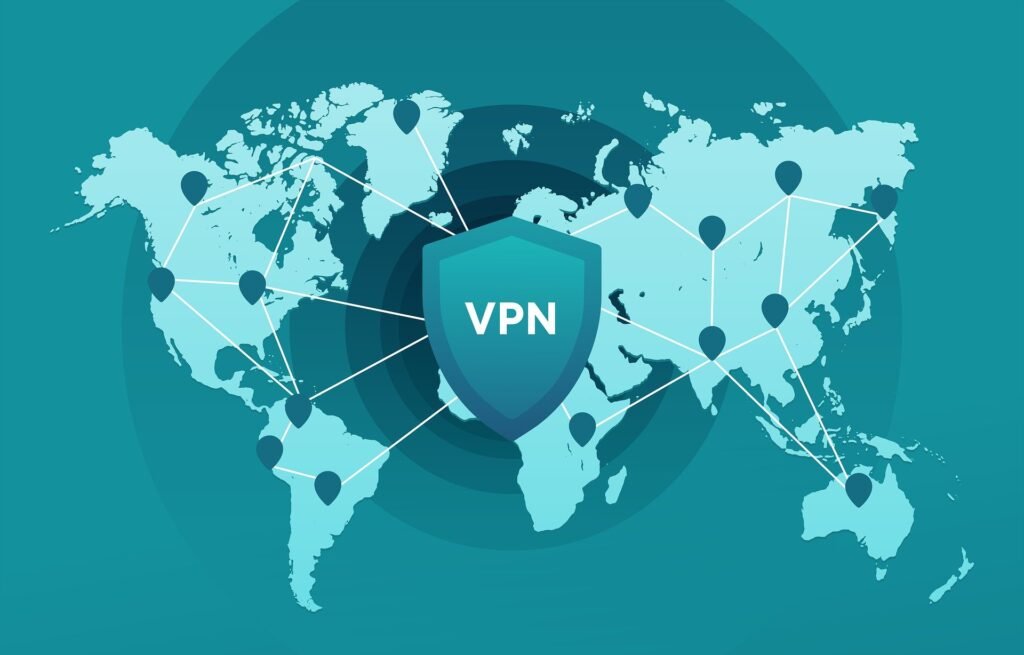A VPN, or Virtual Private Network, is a tool that creates a secure connection between your device and the internet. It hides your real location by routing your online activity through servers in different countries. This helps protect your privacy and keeps your data safe from hackers.
For sports fans, using a VPN is especially helpful because many live sports streams are restricted by location. This means some games or channels might only be available in certain countries. A VPN lets you bypass these geo-blocks by connecting to a server where the content is allowed. As a result, you can watch your favorite sports events live, no matter where you are.
Whether you want to access international sports leagues, avoid blackouts, or improve streaming speeds, a VPN gives you more freedom and control over how you watch sports online.
How VPNs Bypass Geo-Restrictions on Sports Streams
Geo-blocking is a technology used by streaming services and broadcasters to control who can watch their content based on the viewer’s location. This means that certain sports events or channels may only be available in specific countries or regions. For example, a soccer match might be streamed live in Spain but blocked in the United States.
Geo-blocking is common because sports leagues sell broadcasting rights differently in each country. These restrictions prevent viewers outside the allowed region from accessing the live streams, limiting the audience and protecting the rights holders’ agreements.
How Does a VPN Unblock Restricted Sports Content?
A VPN works by changing your device’s apparent location. When you connect to a VPN server in another country, your internet traffic appears to come from that country instead of your real location. This tricks streaming services into thinking you are in a permitted region, giving you access to blocked sports streams.
For example, if a soccer game is only available to viewers in the UK, connecting your VPN to a UK server allows you to watch the game live as if you were physically there.

By bypassing geo-restrictions with a VPN, you gain access to a wider range of sports events, including international leagues and tournaments, without worrying about location limits.
Top Features to Look for in a VPN for Sports Streaming
Choosing the right VPN can make all the difference in how smoothly you stream your favorite sports. Not all VPNs are created equal, so here are the key features you should look for when picking a VPN for sports streaming.
1. Fast Speeds and Low Latency
When watching live sports, every second counts. Buffering, delays, or lag can ruin the experience, especially during important moments. A good VPN must offer fast connection speeds and low latency (the time it takes for data to travel between your device and the streaming server).
Look for VPNs that provide unlimited bandwidth and use high-speed servers optimized for streaming. This ensures smooth video playback without interruptions, even in high definition.
2. Large Server Network and Location Variety
Sports fans often want to watch games from different countries, so a VPN with a large number of servers across many locations is crucial. The more countries and cities a VPN covers, the more options you have to unblock geo-restricted content.
For example, if a sports event is only available in Germany or the US, you’ll want a VPN with reliable servers in those countries. A wide network also means less crowding on each server, which helps maintain fast speeds.
3. Strong Security and Privacy Features
While streaming sports, protecting your online privacy is important. A VPN should use strong encryption to keep your data safe from hackers, ISPs, or anyone trying to track your activities.
Look for VPNs with:
- AES 256-bit encryption (industry standard)
- No-log policies ensuring they don’t store your browsing data
- Kill switch feature that stops internet access if the VPN connection drops, preventing accidental exposure
- DNS leak protection to make sure your real location stays hidden
These security features keep your streaming activity private and protect you from cyber threats.
4. User-Friendly Apps and Multi-Device Support
A great VPN should be easy to use, even if you’re not tech-savvy. Look for VPNs with intuitive, well-designed apps for Android, iOS, Windows, Mac, and other devices. This way, you can stream sports on your phone, tablet, computer, or even smart TV without hassle.
Also, check how many devices you can connect at the same time. The best VPNs allow multiple simultaneous connections, so your whole family can enjoy sports on their devices under one subscription.
By choosing a VPN with these features, you’ll get a smooth, safe, and flexible sports streaming experience on any device.
Best VPNs for Streaming Sports in 2025
Whether you’re a football fanatic, a tennis follower, or a die-hard basketball fan, using the right VPN can open up global access to live sports. Below are the top-performing VPNs in 2025 that offer fast speeds, wide server coverage, and reliable access to major sports streaming platforms.
1. ExpressVPN – Premium Performance and Global Access

ExpressVPN continues to be one of the best choices for streaming live sports. Known for its fast speeds and strong reliability, it allows users to access sporting events from around the world without buffering or lag.
With servers in 105 countries, it unlocks popular streaming platforms like ESPN, DAZN, BT Sport, beIN Sports, and more. It also uses powerful encryption to keep your online activities private, making it a perfect mix of speed, security, and simplicity.
Key Features & Benefits:
- Servers in over 105 countries
- Lightning-fast speeds ideal for HD and 4K sports streaming
- Works with Netflix, ESPN+, Hulu, DAZN, and more
- TrustedServer technology ensures no data logs are kept
- One-click connect and easy-to-use apps for all devices
Pros:
- Excellent for bypassing geo-restrictions
- Reliable connection with minimal buffering
- Works in restrictive countries like China and UAE
- 24/7 live customer support
Cons:
- More expensive than most other VPNs
- Limited to 8 simultaneous connections
2. NordVPN – Balanced, Secure, and Fast for Sports Streaming

NordVPN is a top choice among sports fans thanks to its combination of speed, advanced security, and smart streaming features. It has over 6,000 servers in 111+ countries, many of which are optimized for streaming.
It also includes a feature called SmartPlay, which helps you unblock sports content automatically without manual setup. NordVPN performs well even during peak sports events like the Champions League or NBA playoffs.
Key Features & Benefits:
- Over 6,000 high-speed servers across 110+ countries
- SmartPlay feature for easy streaming access
- Advanced security with Double VPN and threat protection
- Compatible with Android, iOS, Firestick, and more
Pros:
- Great balance between speed and privacy
- Can handle multiple streams at once
- Works with DAZN, ESPN, BBC iPlayer, and others
- 10 simultaneous device connections
Cons:
- Desktop app can feel a bit bulky
- Occasional slow server connections in very distant regions
3. Surfshark – Budget-Friendly and Feature-Packed

If you’re looking for a powerful VPN at an affordable price, Surfshark is your best bet. It offers unlimited simultaneous connections, meaning you can share it with friends and family.
Despite being budget-friendly, Surfshark doesn’t cut corners—it unblocks nearly every major sports platform and maintains great streaming quality. It also offers CleanWeb, which blocks ads and malware while you stream.
Key Features & Benefits:
- Servers in 100+ countries
- Unlimited devices on one account
- CleanWeb blocks annoying ads during streaming
- Works with all major sports apps and platforms
Pros:
- Most affordable premium VPN on this list
- Unlimited device use per subscription
- Fast speeds with minimal lag
- Excellent mobile and smart TV apps
Cons:
- Some servers may require manual switching for specific platforms
- Customer support not as fast as ExpressVPN’s
Other Notable VPNs to Consider
These VPNs also perform well for sports streaming, especially if you’re looking for specific features or regional access:
CyberGhost
- Over 10,000 servers worldwide
- Dedicated servers for sports and streaming platforms
- Easy interface for beginners
- 7 simultaneous connections
- Long-term plans are very affordable
Con: Slightly slower speeds on some distant servers
Private Internet Access (PIA)
- Huge server network in 90+ countries
- Strong customization for advanced users
- High level of security and privacy
- 10 simultaneous connections
Con: Can be overwhelming for casual users
These VPNs all offer excellent performance for sports streaming in 2025. If you want top-tier speed and reliability, go with ExpressVPN. If you’re looking for a great balance of features and price, NordVPN is ideal. If budget and unlimited devices matter most, Surfshark offers unmatched value.
How to Set Up and Use a VPN for Streaming Sports
Using a VPN for streaming sports is easier than you might think. Follow these simple steps to get started on your device and enjoy live games from anywhere.
Step-by-Step Guide to Installing a VPN on Different Devices
1. Choose and Subscribe to a VPN Service
Start by picking a reliable VPN like ExpressVPN, NordVPN, or Surfshark. Visit their official website and choose a subscription plan that fits your needs.
2. Download the VPN App
- On Android or iOS: Go to Google Play Store or Apple App Store, search for your VPN, and download the app.
- On Windows or Mac: Visit the VPN provider’s website and download the desktop app.
- On Smart TVs or Streaming Devices: Some VPNs support smart TVs or devices like Firestick. Download the app directly or set up the VPN on your router.
3. Install and Open the App
Follow the on-screen instructions to install the VPN app. Open the app once installed.
4. Log In to Your Account
Enter your username and password created during subscription.
5. Connect to a Server
Select a server in the country where the sports stream is available. For example, if a game is streaming in the UK, choose a UK server.
6. Start Streaming Sports
Once connected, open your sports streaming app or website. You should now have access to geo-restricted content.
Tips for Choosing the Right VPN Server for Sports Streams

- Pick a Server Close to the Streaming Service’s Location: Connecting to a server physically closer to the streaming platform’s region reduces lag and improves video quality.
- Use Streaming-Optimized Servers: Some VPNs label servers specifically optimized for streaming. Use these when available.
- Avoid Crowded Servers: If your stream buffers or lags, try switching to a different server in the same country for better performance.
- Consider Your Internet Speed: Connecting to distant servers may slow down your speed. Choose the fastest server that unblocks your content.
- Test Before Important Matches: Try connecting and loading the stream before the game starts to troubleshoot any issues.
With these easy steps and tips, you can confidently use a VPN to watch live sports from anywhere in the world without missing a moment.
Common Issues When Using VPNs for Sports Streaming and How to Fix Them
Using a VPN to stream sports is usually smooth, but sometimes you might face a few common problems. Below are typical issues and easy ways to fix them so you can enjoy uninterrupted live sports.
1. VPN Connection Problems
Issue: Sometimes your VPN may fail to connect or keeps disconnecting. This can stop you from accessing sports streams altogether.
Fix:
- Restart your VPN app and try connecting again.
- Switch to a different VPN server—sometimes specific servers have temporary outages.
- Make sure your internet connection is stable.
- Update your VPN app to the latest version to fix bugs.
- If problems persist, contact your VPN’s customer support for help.
2. Streaming Platform Blocks and VPN Detection
Issue: Many streaming services now try to detect and block VPN traffic. You may see error messages like “Proxy Detected” or be prevented from watching the stream.
Fix:
- Use a VPN known for bypassing strict blocks like ExpressVPN or NordVPN.
- Switch to a different server or a streaming-optimized server in your VPN app.
- Clear your browser’s cache and cookies before accessing the streaming site again.
- Enable any special features in your VPN app designed to avoid detection (such as obfuscated servers).
- If all else fails, try using a different streaming platform or check for official apps that support VPN use.
3. Buffering and Speed Concerns

Issue: Streaming sports live requires fast internet speeds. Using a VPN can sometimes slow down your connection, causing buffering or low video quality.
Fix:
- Connect to a VPN server closest to your real location or the streaming source to reduce lag.
- Choose servers marked as “fast” or “streaming optimized” in your VPN app.
- Close other apps or devices using your internet to free up bandwidth.
- Switch from Wi-Fi to a wired Ethernet connection if possible for better stability.
- Lower the video quality temporarily if your internet speed is slow.
- Consider upgrading your internet plan if speeds are consistently low.
By knowing these common issues and how to fix them, you can keep your VPN working smoothly and enjoy live sports streaming without interruptions.
Is Using a VPN for Sports Streaming Legal?
Using a VPN itself is legal in most countries around the world. VPNs are tools designed to protect your privacy, secure your internet connection, and help you access content more freely. Many businesses and individuals use VPNs daily for safety and security.
When it comes to streaming sports, using a VPN to watch content that is legally available in another country is generally considered legal. However, it’s important to understand that some streaming platforms have terms of service that prohibit the use of VPNs to bypass regional restrictions. Violating these terms may result in the suspension of your streaming account, but it is not usually a legal offense.
While using a VPN is mostly legal, some risks and ethical points should be kept in mind:
- Terms of Service: Streaming services may block or restrict users found using VPNs to access geo-restricted content. This can result in losing access to the service.
- Copyright Laws: Watching pirated streams or unlicensed content, whether using a VPN or not, is illegal in most countries and can lead to legal consequences. Always use VPNs with official, legal streaming services.
- Respecting Licensing Agreements: Content providers negotiate licensing based on regions. Bypassing geo-restrictions may violate these agreements, which some people view as ethically questionable.
In summary, using a VPN for streaming sports is legal in most places, but it’s important to use it responsibly. Stick to official streaming platforms and respect their rules to enjoy sports safely and legally.
Best Practices for Using VPNs with Sports Streaming Services
Using a VPN to watch live sports is a great way to unlock content and protect your privacy. However, to get the best experience, it’s important to follow some key best practices. These tips will help you avoid common pitfalls and make your streaming fast, secure, and hassle-free.
1. Choose Reputable and Trusted VPN Providers

Not all VPNs are created equal. For streaming sports, reliability and speed are crucial. Trusted VPNs like ExpressVPN, NordVPN, and Surfshark invest heavily in maintaining large, fast server networks and strong security features.
These providers also have a proven track record of bypassing tough geo-restrictions imposed by streaming platforms. Avoid lesser-known or free VPNs, which often have slow speeds, limited servers, or poor security that can ruin your streaming experience.
2. Connect to the Right Server Location
To stream sports smoothly, always connect to a VPN server located in the country or region where your desired content is officially available. For example, if you want to watch a La Liga match streamed on a Spanish platform, connect to a server in Spain.
Many VPN apps highlight servers optimized specifically for streaming—these tend to have faster speeds and are less likely to be blocked by streaming services. Avoid overcrowded or distant servers, which can slow your connection and cause buffering.
3. Test Your VPN Setup Before Important Matches
Live sports are time-sensitive, and nothing is more frustrating than a VPN failing during a big game. To avoid this, always test your VPN connection well in advance. Try streaming the event or a similar live broadcast from the region you want to access.
This helps you identify and fix any speed or access issues early, such as switching servers or restarting your app.
4. Keep VPN and Streaming Apps Updated
VPN providers frequently release updates that improve security, speed, and compatibility with popular streaming platforms. Likewise, sports streaming apps regularly update to enhance performance and patch bugs.
Keeping both VPN and streaming apps up to date reduces the chance of crashes, login errors, or detection by streaming services that block VPNs.
5. Avoid Using Free VPNs for Sports Streaming
While free VPNs may sound tempting, they come with many limitations. Free VPNs typically offer only a few servers, have data caps, and deliver slower speeds—making live sports streaming difficult or impossible.
Furthermore, many free VPNs rely on showing ads or collecting user data to generate revenue, which compromises your privacy. Investing in a paid VPN ensures faster connections, more server options, stronger encryption, and no data restrictions.
6. Respect Streaming Service Terms and Conditions
Though using a VPN is legal, many streaming platforms have rules against bypassing regional restrictions. If detected, your account may be suspended or blocked. To avoid trouble, always read and understand the terms of use for your streaming service.
Using a VPN responsibly and pairing it with official subscriptions helps ensure uninterrupted access and avoids ethical or legal issues.
7. Use VPN Features Designed for Streaming
Some VPNs offer special features to enhance your streaming experience. For example, ExpressVPN’s TrustedServer technology deletes user data after each session, ensuring privacy. NordVPN includes SmartPlay technology that automatically bypasses geo-blocks without complicated setup.
Surfshark offers CleanWeb, which blocks ads and trackers that could interrupt your streaming. Learning to use these features can significantly improve your live sports viewing.
8. Optimize Your Internet Connection for VPN Use
VPNs encrypt your internet traffic, which adds extra processing and can sometimes slow speeds. To minimize this:
- Use a wired Ethernet connection if possible, as it’s more stable than Wi-Fi.
- Close unnecessary apps and devices using the same network.
- If your VPN app allows it, select faster VPN protocols like WireGuard or OpenVPN UDP.
- Avoid peak internet usage hours in your area if you notice speed drops.
Following these detailed best practices will help you enjoy live sports streaming with a VPN that is fast, secure, and reliable. This way, you won’t miss any of the action, no matter where you are in the world.
Free vs Paid VPNs for Streaming Sports: What You Should Know

When it comes to choosing between free and paid VPNs for streaming sports, there are important differences to consider. Free VPNs are attractive because they don’t cost anything and are easy to try out.
Many free VPN apps have simple setups and can be used immediately without payment, making them tempting for casual users or those new to VPNs. However, these free services often come with significant limitations that can affect your streaming experience.
One major drawback of free VPNs is the limited number of servers and locations available. This can make it difficult or even impossible to access specific sports streams that are restricted to certain countries.
Additionally, free VPN servers tend to be overcrowded because so many people use the same limited resources. This leads to slower speeds and frequent buffering — a frustrating problem when trying to watch live sports where timing is critical. Many free VPNs also impose data caps, meaning you can only use a small amount of bandwidth each month. Streaming video uses a lot of data, so hitting those limits quickly becomes a problem.
On top of that, some free VPNs display ads or track your online activity to make money, which raises privacy concerns. Finally, streaming services have become better at detecting and blocking free VPNs, meaning these services might not even let you watch your favorite games.
Paid VPNs, on the other hand, are generally a far better option for live sports streaming. They provide faster, more reliable connections because they maintain larger and less crowded server networks optimized for high-bandwidth activities like video streaming. Paid services offer a broad selection of servers across many countries, giving you more options to access geo-restricted sports content no matter where you are.
Another important advantage is that paid VPNs typically offer unlimited data, so you can watch every match without worrying about running out of bandwidth or facing speed throttling.
Security and privacy are stronger with paid VPNs too. Reputable providers use advanced encryption and enforce strict no-logs policies, meaning they do not record or sell your browsing data. This gives you peace of mind that your online activity stays private.
Additionally, top paid VPNs like ExpressVPN, NordVPN, and Surfshark frequently update their technology and servers to bypass VPN blocks by streaming platforms. They also offer dedicated customer support to help solve any technical issues, making the streaming experience smoother.
Conclusion
Using a VPN for streaming sports can unlock access to more games and protect your online privacy. While free VPNs may seem appealing, they often come with limitations like slow speeds, data caps, and security risks that disrupt your viewing experience.
Paid VPNs, such as ExpressVPN, NordVPN, and Surfshark, provide faster connections, more server options, and stronger privacy protections, making them the best choice for live sports fans. By choosing a reliable VPN and following best practices, you can enjoy smooth, secure, and legal streaming of your favorite sports from anywhere in the world.






